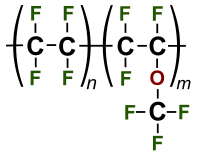How Mushrooms Can Eliminate Forever Chemicals: Shroom Stop's Innovative Approach in Canada
Perfluoroalkoxy alkanes
In our modern lives, we often encounter nonstick cookware, grease-resistant food packaging, and waterproof clothing that add convenience but come at a cost. These products owe their desirable properties to a class of manmade chemicals known as PFAS (per- and polyfluoroalkyl substances). PFAS make consumer goods water-, stain-, and grease-resistant, but they also pose significant health risks due to their toxicity at extremely low levels. These chemicals are virtually indestructible, earning them the nickname "forever chemicals." However, there is hope on the horizon, thanks to the groundbreaking work of Shroom Stop, a company dedicated to designing and breeding mushroom strains capable of breaking down these harmful substances.
Mycelium capable of producing enzymes that break down Organic molecules that contain carbon.
PFAS chemicals are nearly impossible to avoid, as they are found in our homes, offices, and supermarkets, virtually everywhere we go. They resist breakdown in the environment and in our bodies, persisting for extended periods. PFAS also have the ability to quickly move through the environment, making containment challenging. Even low levels of exposure can have detrimental effects on our health, making them particularly dangerous.
While the use of PFAS remains a concern globally, let's focus on Canada and the efforts being made to address this issue. Manufacturers in Canada are not required to disclose the use of PFAS in their products to consumers, leaving them uninformed and vulnerable. The lack of regulation and testing for most PFAS chemicals by regulatory bodies further exacerbates the problem.
However, in Canada, Shroom Stop is leading the way in developing mushroom strains that have the unique ability to break down PFAS chemicals. Through innovative design and breeding techniques, Shroom Stop is harnessing the natural power of mushrooms to tackle the PFAS contamination crisis. This breakthrough technology has the potential to revolutionize how we deal with PFAS and significantly reduce their harmful effects on human health and the environment. Our technology also allows us to target PFAS that can be found in water sources.
To protect ourselves and contribute to the fight against PFAS contamination, it's crucial to stay informed and take action. Researching the brands we support to determine if they have eliminated PFAS from their products or offer PFAS-free alternatives is an important step. Advocacy and consumer pressure can encourage companies to prioritize the removal of PFAS from their supply chains.
In Canada, it's important to advocate for comprehensive monitoring and regulation of PFAS chemicals. Engaging with water providers to request data on PFAS testing in your area is a proactive approach. Encouraging the implementation of effective treatment systems to remove PFAS from the water supply, even when not legally required, can help protect communities from the harmful effects of these chemicals. Additionally, exploring the use of home water filters, particularly those utilizing reverse osmosis technology, can aid in reducing PFAS contamination levels.
Addressing the presence of PFAS in food requires conscious consumer choices. Opting for alternatives to nonstick cookware, such as stainless steel, cast-iron, glass, or ceramic options, can help reduce exposure. A properly seasoned cast iron pan provides safer non-stick properties that wont scratch off into your food. Being mindful of food packaging and avoiding heating food wrapped in grease-resistant materials can also minimize PFAS intake. Supporting compostable packaging that is certified as PFAS-free by reputable organizations ensures a safer and more sustainable choice.
In addition to their presence in everyday products, PFAS chemicals have now been discovered to contaminate farmers' fields and seep into vegetables. These harmful substances can infiltrate the soil, water, and air surrounding agricultural areas, posing a significant risk to food production. Studies have found PFAS in produce grown near manufacturing plants or in areas affected by industrial dumping. Of the samples taken, a significant number were found to contain PFAS. This means that the food we consume, including vegetables, may unknowingly carry traces of these forever chemicals. The contamination of farmers' fields and the subsequent uptake of PFAS by vegetables underscores the urgent need for comprehensive monitoring and regulations to protect the food supply and ensure the safety of consumers.
In Canada, the government and regulatory bodies must prioritize the regulation and comprehensive testing of PFAS chemicals. Establishing stricter regulations, comprehensive monitoring programs, and transparent reporting practices will play a vital role in mitigating the risks associated with PFAS contamination.
While challenges remain, the work of organizations like Shroom Stop and the collective efforts of individuals, advocacy groups, and policymakers can pave the way for a PFAS-free future in Canada. By supporting innovation, raising awareness, and demanding stronger regulations, we can eliminate forever chemicals and create a healthier environment for generations to come.

